With a mix of stunning art and mad science, Ani Liu tackles the big questions stirring inside us.
YouFab First Prize Winner Ani Liu caught up with Loftwork to share the sweat, stress, and sentiment that went into her winning entry “The Mind in the Machine,” how it’s changed her worldview, and what’s on her mind right now.
We are lucky to be graced with artists like Ani Liu to guide us through the thorny, absurd, and essential questions of our time. What does it mean to be human? How do we relate to the technology we’ve created? Do we like the world we live in? Where might we go from here?

Liu's approach is equal parts playful experimentation and considerable R&D
Liu’s body of work is powerful in that it surfaces questions already stirring inside us, while leaving us in awe and feeling sure we couldn’t have articulated it quite the way she does. For example: to explore the use of science for emotional needs, Liu distilled and bottled scents from sweat-stained T-shirts of her loved ones (“holding back is another kind of need”). To provoke a discussion around society’s transactional treatment of womens’ bodies, Liu designed a circuit that could control the movement of sperm using brain waves (“mind-controlled spermatozoa”). If you scroll through her portfolio, you’ll find her project titles read like sci-fi poetry.
Her approach – equal parts playful experimentation and considerable R&D – is award-winning and has been featured in National Geographic, VICE, and WIRED and shown at Queens Museum Biennial, Boston Museum of Fine Arts, the Asian Art Museum, Shenzhen Design Society, as well as the MIT Media Lab, where Liu received her master’s in science, and Harvard University, where she received her master’s in Architecture and currently teaches part-time at the Graduate School of Design.
Her winning streak continues – earlier this year, Liu was the first prize winner of the YouFab Global Creative Awards 2018 for “The Mind in the Machine,” an exploration of our relationship with manufactured goods and mechanical production.
Tangibly, Liu presents us with a series of fabrics whose patterns have been created using a machine, with one catch – the machine was programmed by Liu controlled by the brain activity of a factory worker in China. In turn, a tighter stitch represents a moment of frustration, while a looser stretch expresses a more relaxed, meditative state.
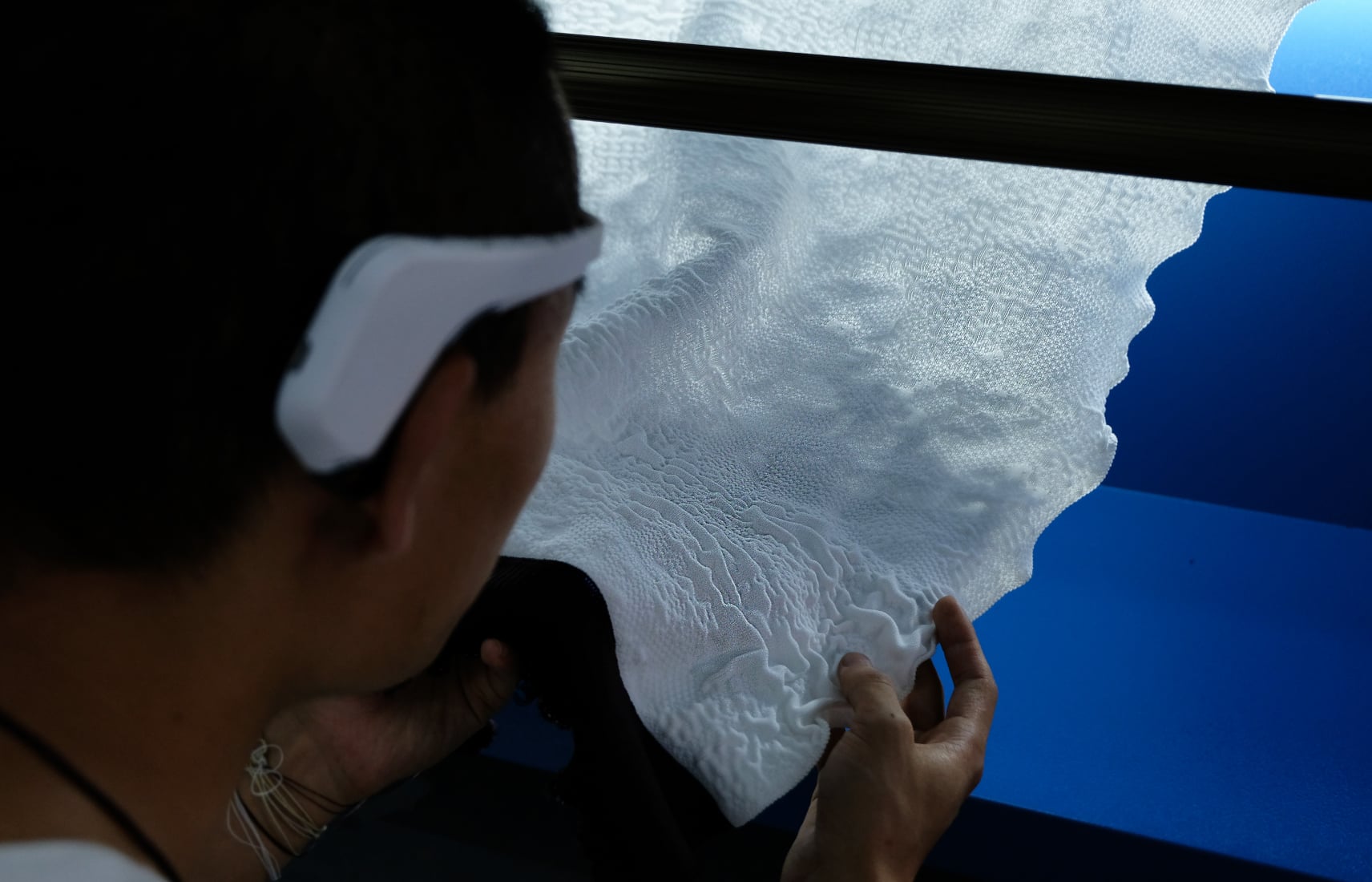
In a quiet moment in her New York apartment, Liu caught up with Loftwork to share the sweat, stress, and sentiment that went into her winning entry “The Mind in the Machine,” how it’s changed her worldview, and what’s on her mind these days.
The interview has been lightly edited for clarity.
A study of our relationships with manufactured goods and mechanical production
What are you hoping to communicate with “The Mind in the Machine”?
I was interested in two things: the politics of labor and also what it means to create things in an age of mechanical production. As an artist, I feel really connected to the things I make, especially with the older media I was trained in like working with clay and sculpting; the way you feel directly imprints itself into the medium. Now I do a lot of work that is mediated by machines. If I have an idea for something, often I’ll have to write code or program a machine to CNC or laser cut. I was really interested in how to create something that has the emotional palpability of an artist creating in the moment while still utilizing the amazing technologies that we’ve developed. The piece tries to embody those two things. It tries to create a portrait of the textile factory worker through a knit that reflects his or her mood and state of mind as it’s being made.
Most of your work begins with a desire or question from your personal life. What was personal about this project?
I had a lot of personal connection to China. Both of my parents immigrated from China right after the Cultural Revolution and where they experienced a lot of political strife. Both my parents worked very manual labor jobs in the U.S. One of my mother’s first jobs, in addition to waitressing, was working in a factory in Chinatown. I remember her staying up really late at night beading. I have a very personal relationship to the invisible people who make things run smoothly in the world. That moved me to be really interested in going to China to see firsthand how so many of our electronics and clothes are made.
About halfway through my time in China, I was really struggling. I was in the middle of the creative process and wasn’t really sure where it was all going to go. I remember talking to my dad on the phone about how he was sent to be re-educated during the Cultural Revolution by farming rice. And it turns out where he was sent to farm was very close to the factory that I was working in. All of those factory parks used to be farmland. I think we were within five square miles of where he was doing manual labor and now here I’m doing a project on labor. That moment felt very serendipitous and emotional and helped keep me going.
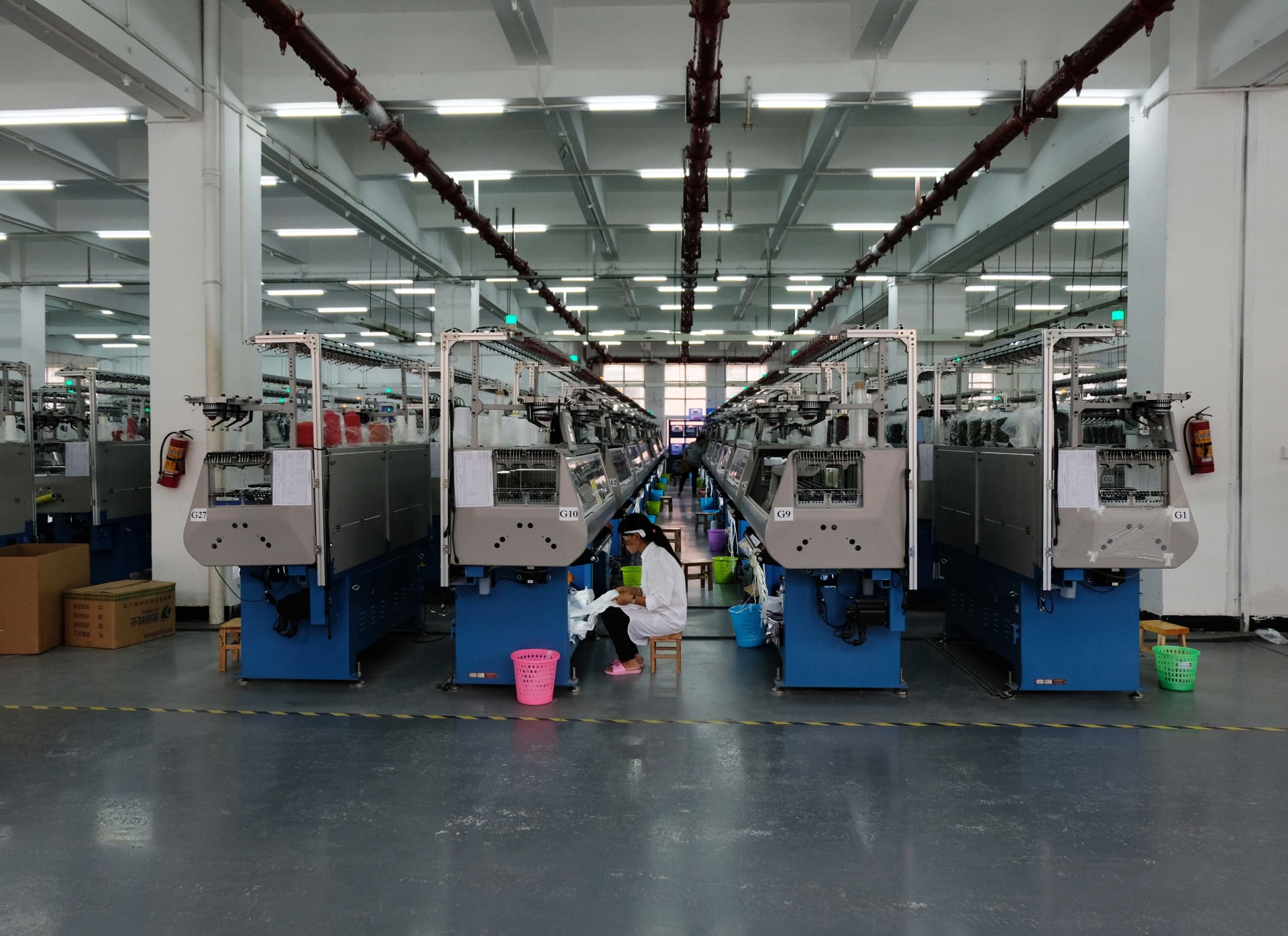
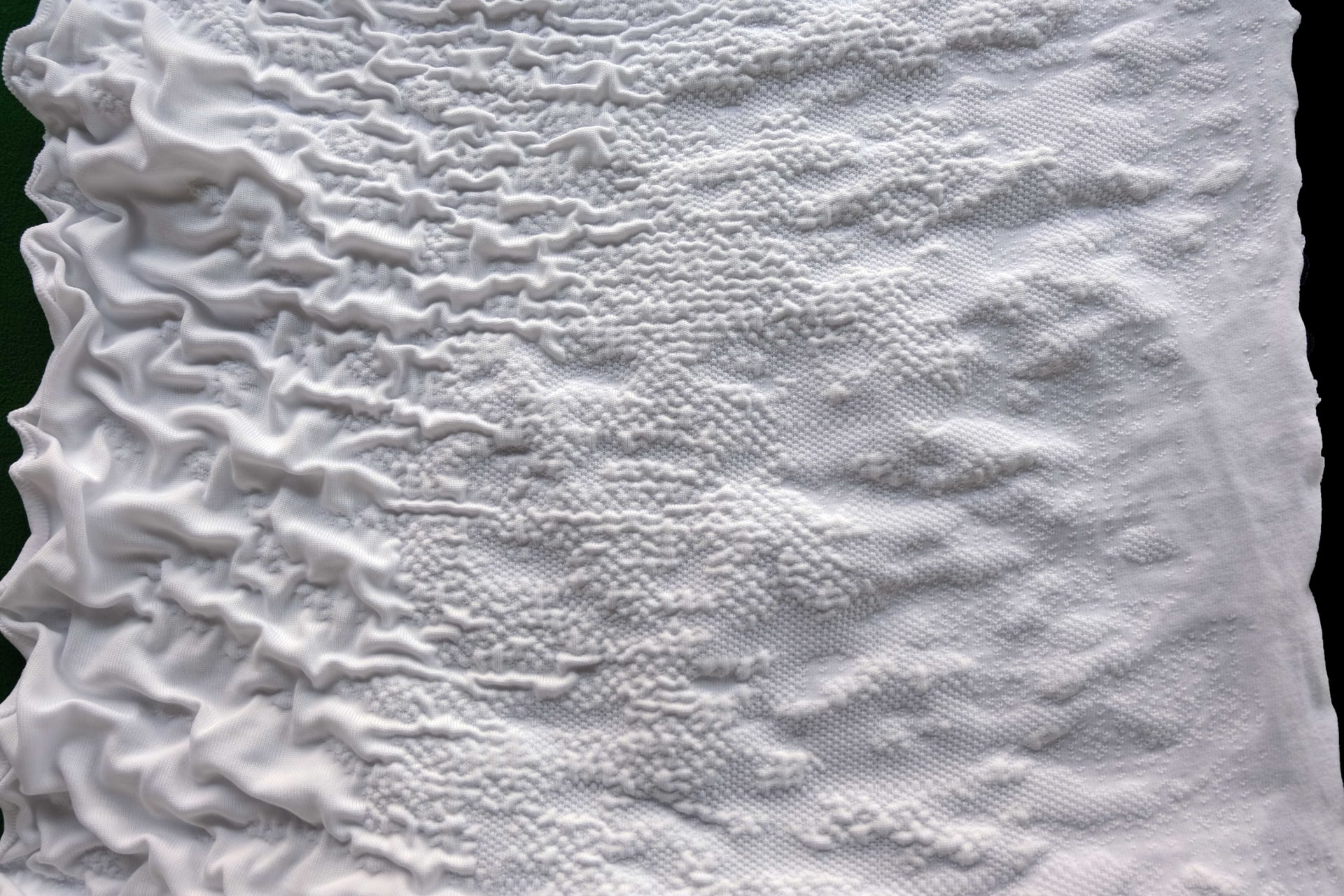
How did you recruit and then work with the factory worker?
When I tried to recruit workers, they were really nervous. They wondered, “Is my boss trying to track our mood?” or “If you put this headset on me, will you read my thoughts?” I assured them that the EEG machine could not read their thoughts, it could only read really broad sentiments like whether or not you’re paying attention, are anxious or relaxed. Even then, only one or two people were open to letting me do this with them.
With the help of a translator, I worked with one woman in particular. At first, I asked some pretty pointed questions as she worked, but she gave me what felt like canned answers. Sensing she was uncomfortable, I decided to pivot and focus on just having her go through a normal work day. The moments when she was stressed were quite normal in a workday as far as I could observe. Occasionally, the machine does jam and you have to untangle thread from specific needles or sometimes a spool runs out of thread and you have to tie it to a new thread. Those moments can be a little stressful because one person operates between 20 and 40 machines. It’s a game where you have to keep track of a lot of them. Those were the moments when she became alert or tense. In the end, her brain signals said a lot more than what she was able to say in words.
For the project, you actually worked in the factory, learning how to use the machines alongside the workers. Is there anything about the world you see differently now?
Physically being in China and in the factories really made me reflect on how I live. I felt super grateful for all the comforts I have. I saw the suffering that was involved in factory life, not in the factory where I worked, but others that I toured. They had rooms that were full of toxic fumes and totally overheated. It sounds cheesy, but it made me want a lot less. When we buy pottery, we still think about the person who made it, but when we pick up an iPhone, because it’s glossy and packaged, we don’t necessarily think about the sweaty person who spends twelve hours a day making it. These aren’t really sleek, sexy, laborless objects, they are full of the fingerprints of people who spend most of their waking days doing this. It gave me a different relationship with all of the objects around me.
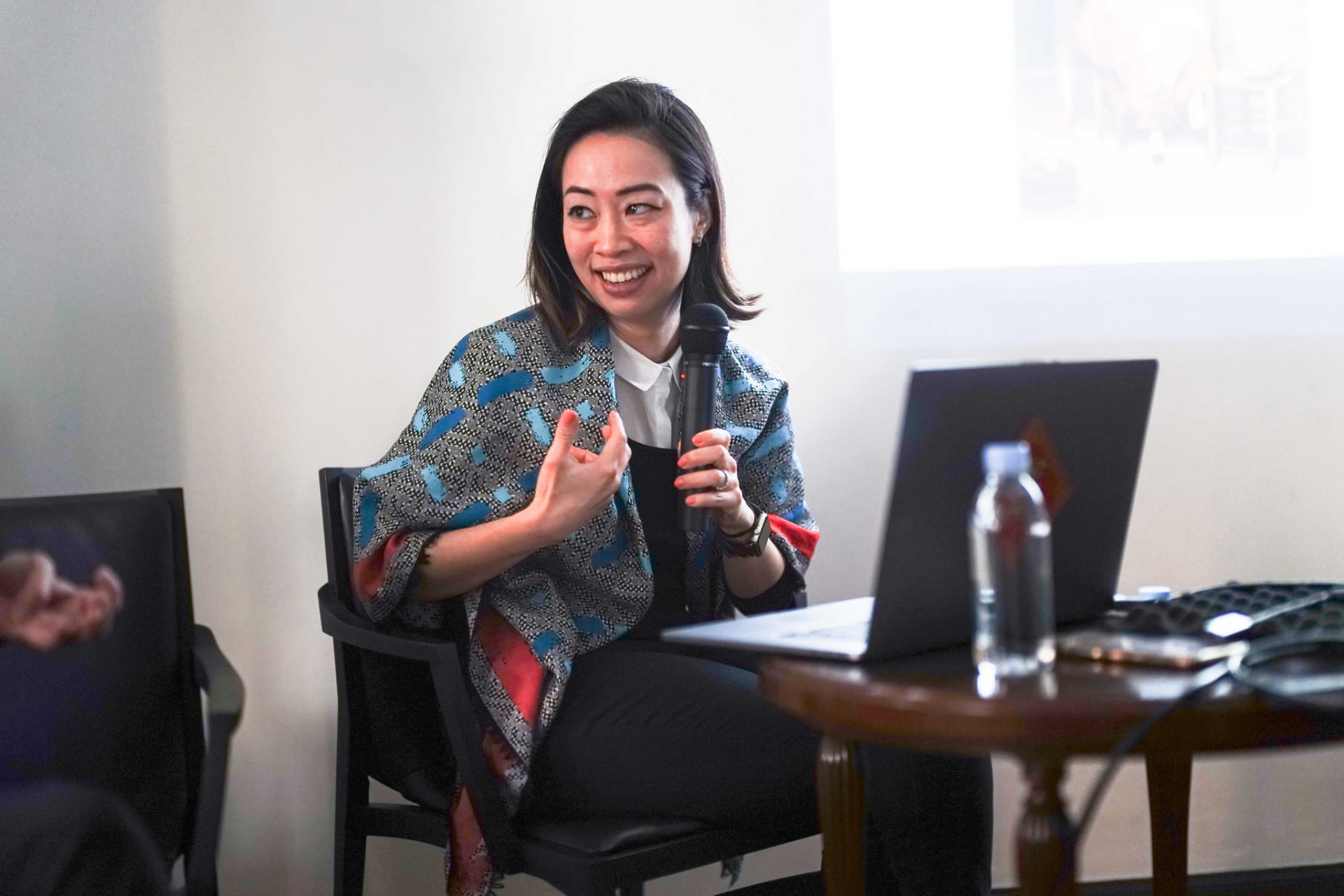
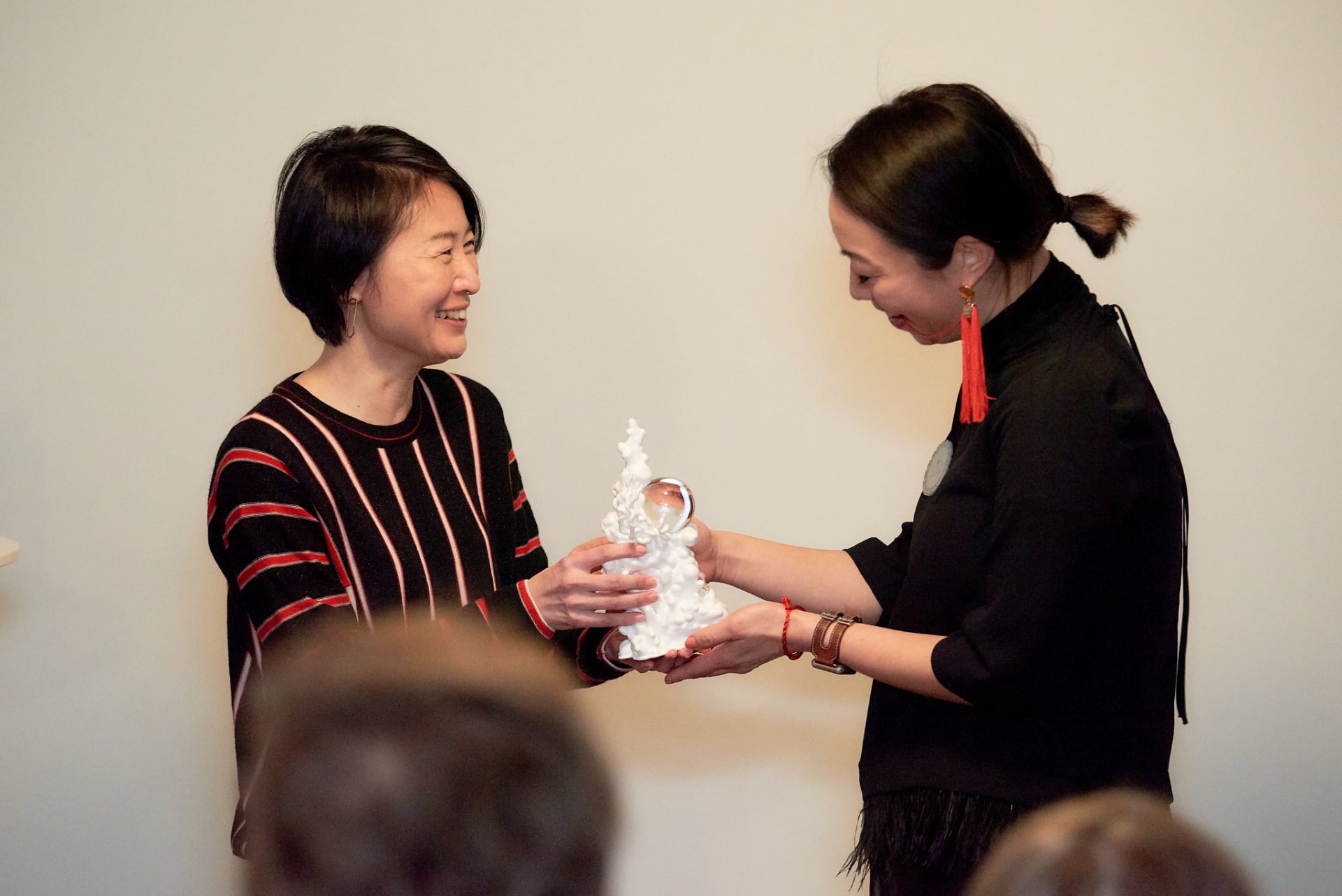
By the way, congratulations on winning YouFab’s first prize! I’m curious – what was your experience like in Japan when you went to receive the YouFab Award? How has the Award influenced you?
I loved my time in Japan! It was my first time there, but I’ve always admired Japanese art, food, and culture from afar, so it was exciting to finally get to visit in person. I am grateful for YouFab for being such great hosts. I had an Airbnb in Shimokitazawa, which was such a hip, cool neighborhood to have a first experience in. I am obsessed with soba and went all around eating at different shops. Sometimes making art can be a lonely endeavor, and obsessively making art can leave you in a bubble; it is always amazing to receive any type of recognition or award. I am very grateful to Youfab for highlighting this work.
What's been on Ani Liu's mind?
I want to switch gears and talk about you as a person and what’s been on your mind. To start, what are some things about you that might surprise people?
I have some fancy sounding degrees, but a lot of the skills I use in my work are self taught. I hope this inspires people who thought STEM was not for them to give it a try! People don’t expect that I love to run and that I’ve completed three marathons. Running is a way I work out difficult feelings. Other tidbits are that I enjoy watching Terrace House and I love corgis!
What is the most valuable item in your workspace?
I’m having a really hard time answering this question! I am quite nostalgic, and have everything from vials of perfume distilled from people I love to an entire ponytail of hair that I’ve saved for a future art project. I also have very old sculptures that I’ve made over a decade ago, and I think they are valuable to keep as a reflection of how much I’ve evolved as an artist.
Where do you go for inspiration?
Whenever I am stuck creatively, or even while debugging, I like to tackle the problem multi- sensorially. I’ve had experiences where I couldn’t figure out how to finish a circuit but became unlocked by smelling different things, or dancing and moving my body in unexpected ways. I like to think of intelligence as a fully embodied network in my body, so sometimes I think massaging a far away area can unlock creatives blocks unexpectedly.
What design trends are you not so fond of right now? Which ones are you curious about?
I’m not so fond of all the algorithms for targeted click bait or the algorithms that generate one-sided news feeds. I am curious about multi-sensory experiential design and neuroscience about the subliminal.
Based on that curiosity – are there any folks, brands, or organizations you’ve been wanting to collaborate with & why?
Because of my fascination with neuroscience and AI, I would love to make art with some of the brain “startups” that mega tech companies have started funding like Deepmind, Neuralink, and Kernal. I think they’re rich with storytelling potential – as well as real world implications. These technologies influence the future of humanity in incredibly profound ways.
How do you feel about the future of our planet right now?
Environmental harm and gender inequality continue to be things that worry me greatly. The future of AI, and the future of human machine augmentation are others.
What are you working on right now?
I’m working on a project where I’m sending a box lined with paper and sensors with a piece of graphite into low orbit space. The graphite will make a drawing in zero gravity, and on earth I am creating an identical arm and recreating its movements- a project about telepresence, long distance relationships, and the future of space travel.
Lastly, I’m curious how do you like being human? Is there anything in the world you would rather be?
My idea of being human is that it’s constantly influx. We’ve created extensions for ourselves, for example this phone we’re using could be considered a prosthetic. I rely on Wikipedia and dictionaries, which is an extension of knowledge and cognition. Then there are mechanical things like bicycles, airplanes, oh, and drugs that mediate our emotional states. So, I don’t know. It’s hard to say what human is. Occasionally, and I know this sounds weird, but I wonder what it’s like to be a plant. There’s a lot of research that shows that plants are intelligent. I also think about some species that have lived for hundreds of hundreds of years, the carbon differences between us are so vast, they communicate through such different signatures. Sometimes I have a bad day and hate all my emotions, but I also know it’s amazing to both have the sensory experiences that we do and also be able to reflect on them.
More about Ani Liu on her official website.
Talk to us! We are always looking for fun collaborations and fun projects from all over the world.
About FabCafe & Youfab
FabCafe is a creative and international community with physical headquarters in Tokyo, Taipei, Bangkok, Hongkong, Kyoto, Toulouse, Hida, Strasbourg, Monterrey, and Barcelona. A cafe and digital fabrication laboratory all in one. People are invited to design, create and prototype using technology, within an open social environment. A community that “creates” globally and “makes” locally. FabCafe Global organizes YouFab Global Creative Awards since 2012. YouFab is a global design awards that recognize and celebrate creative works and inventions that stem from a powerful collaboration between digital and physical fabrication.
About Loftwork
Loftwork Inc. is a global creative company, which designs websites, services, communication and spaces through the collaboration. We are located in Taiwan, Hong kong, Tokyo and Kyoto . We also operate owned media and space. Digital craft cafe “FabCafe” , and co-working space “MTRL (Material)” , and the online platform “AWRD”. We are able to provide a wide variety of creatives with creator communities worldwide. Through the design process, we create good impact to society
Author: Justine Lee
Related Project
Next Contents











